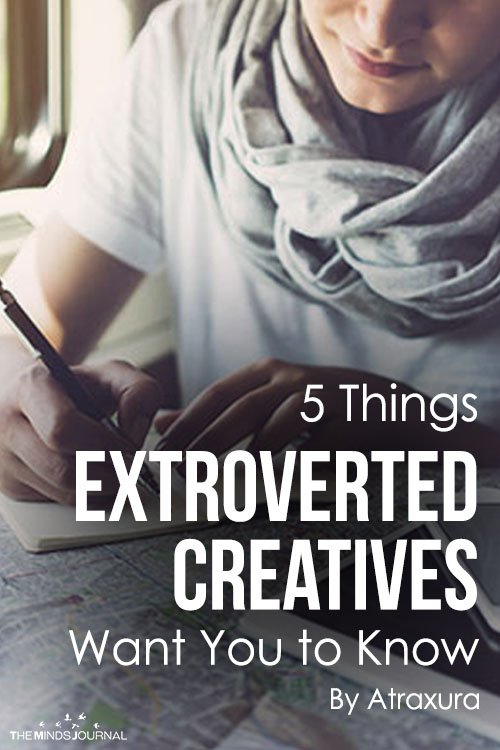5 Things Extroverted Creatives Want You to Know
As a society, we don’t generally see extroverts as the intellectuals, the artists or the creative types, or as people who pursue goals in areas which are (wrongly, in my opinion) stereotyped as “quiet”. We often see extroverts as frivolous, lowbrow party animals — or at least as “friendly” and “people-oriented”.
The truth is, extroverts are simply energized from being among people, while introverts tend to recharge in solitude.
Although I am very extroverted, I was not always aware of it, as I am not a people person or a party animal at all. Rather, I am a task-oriented, choleric-tempered, Type A person of excessive extremes, who needs a high level of eustress in the same sense that everyone else needs air. (And I happen to love an energizing, stimulating environment as well as all things over-the-top.)
Read Are Extroverts Happier Than Introverts? Some Path Breaking Myths, Uncovered
1. We speak to facilitate brainstorming.
We usually think best by talking, and we often come to understandings by talking ideas and situations through. This means that we don’t mean everything we say.
Unless we say so precisely, we don’t intend for our words to be taken as promises or as facts. Our spoken ideas imply only potentials; we don’t mean for them to be seen as scientific facts or as binding contracts.
Likewise, our statements can often be in the form of commands, even if we don’t mean to “order you around”, or mean for you to see it that way. It is just our fast and direct habit of speaking.
2. You — people, that is — inspire us. You help us to think, to generate ideas, whereas reflection alone drains us.
Introverts seem to invent and create better in solitude. (As the great inventor and introvert Nikola Tesla said, “Be alone, that is the secret of invention.”) Yet, extroverted intellectuals and creatives need to bounce our theories and ideas off on others; we are also stimulated by their presence and input. Think of it as a form of nuclear fusion.
As an artist, I often cannot work or focus unless I have someone to talk to simultaneously, or I can fall into a black pit of despair. I enjoy having someone watch while I paint or draw, and I often feel like they contributed to my work as much as I did, even if they never touched it physically. However, I have heard that many artists can’t work while others watch, and will only let others see their art after they are certain it is complete.
3. We value praise and recognition, a lot, but even negative criticism is motivating.
The worst case scenario for us is to receive no response at all.
4. We can be overreacting, dramatic, intense, excitable and maybe even hyper-manic.
(Believe me, I’ve been called all of these and more — such as “wild” and “fanatical” — but I am finally becoming proud of these traits.) Subtlety, however, is not in our vocabularies, and inertia is antithetical to our systems.
We don’t “chill”, and we don’t “keep calm” or “relax”, ever. We don’t want to.
We yearn for energizing, stimulating, and invigorating activities and environments. We need fire and passion in our lives, and we thrive on running full-caliber. We seek out excess and eustress, and we love all things loud and over-the-top.
We enjoy this energy; it is our ideal state, so don’t try to hold us back or bring us down in any way. What is “cozy” for you can be stuffy and stifling to us. Similarly, all of which is “calm,” “quiet,” “peaceful,” “relaxed” and “soothing” can feel like a prison sentence to an extrovert. Different things feel good to different people, and everyone has their own definition of happy. Enthusiasm lights us up, whereas sentimentality can drain us of our vitality. Feed our flame to keep us happy. We love those with whom we can be fully ourselves without restraint.
5. Don’t be embarrassed about not being as expressive or as excitable as us.
We admire your composure and your ability to keep yourself together when we incapacitate ourselves laughing. Also, patience and stability are virtues we value a lot — in other people. We don’t expect you to behave the same way we do (most people don’t, after all), and it doesn’t make you any less fun to be around. We wouldn’t want to have to share the spotlight with you anyway.

